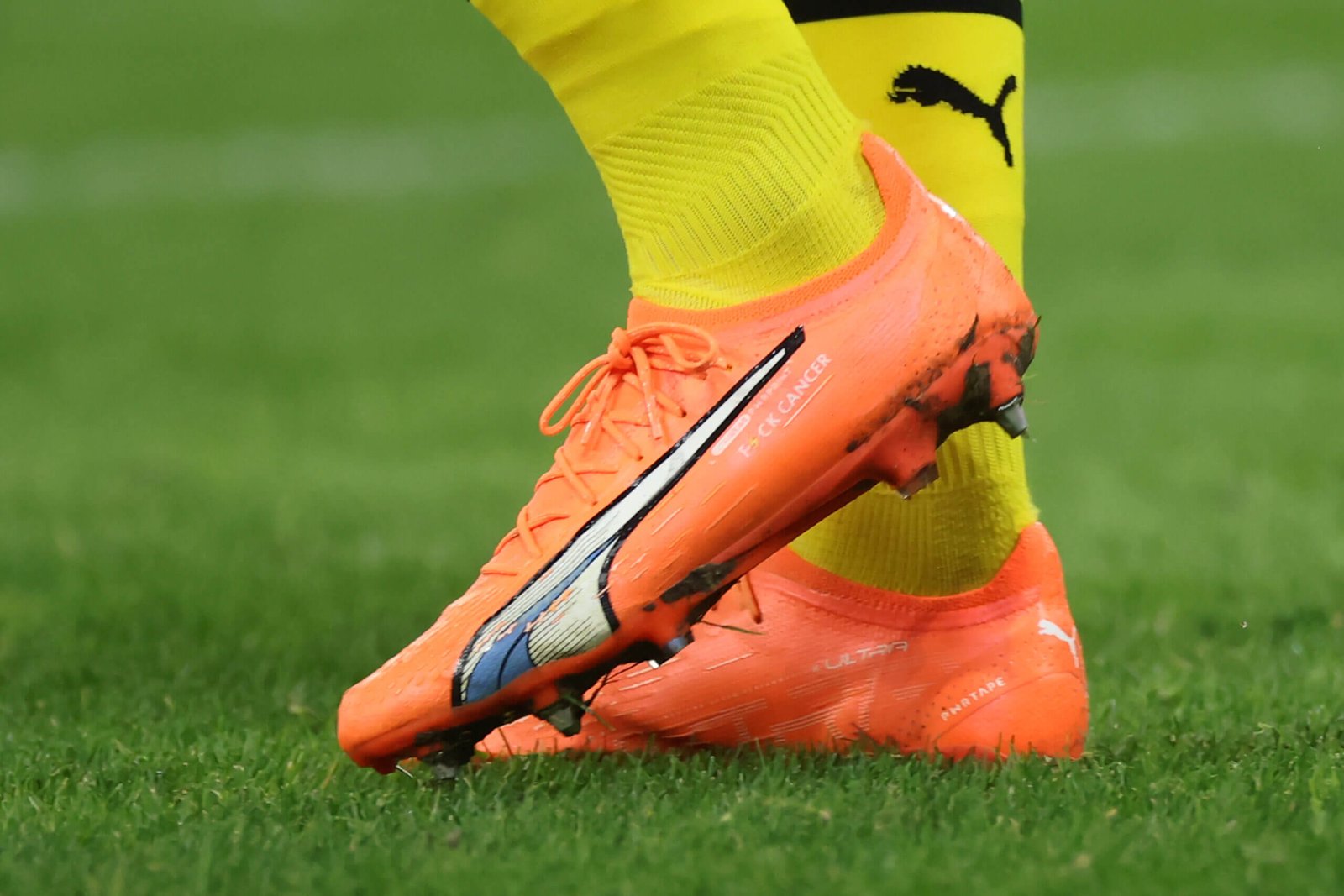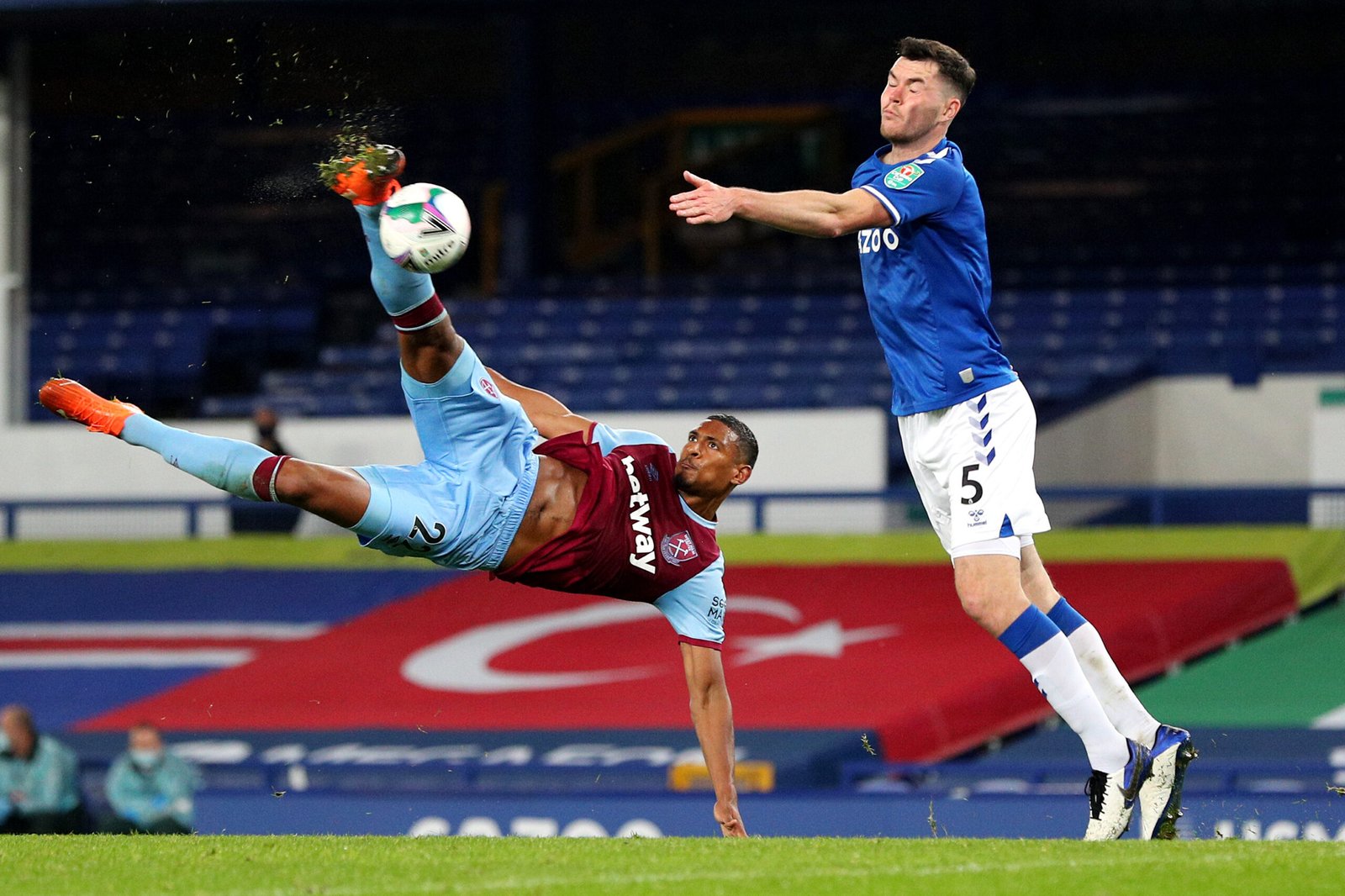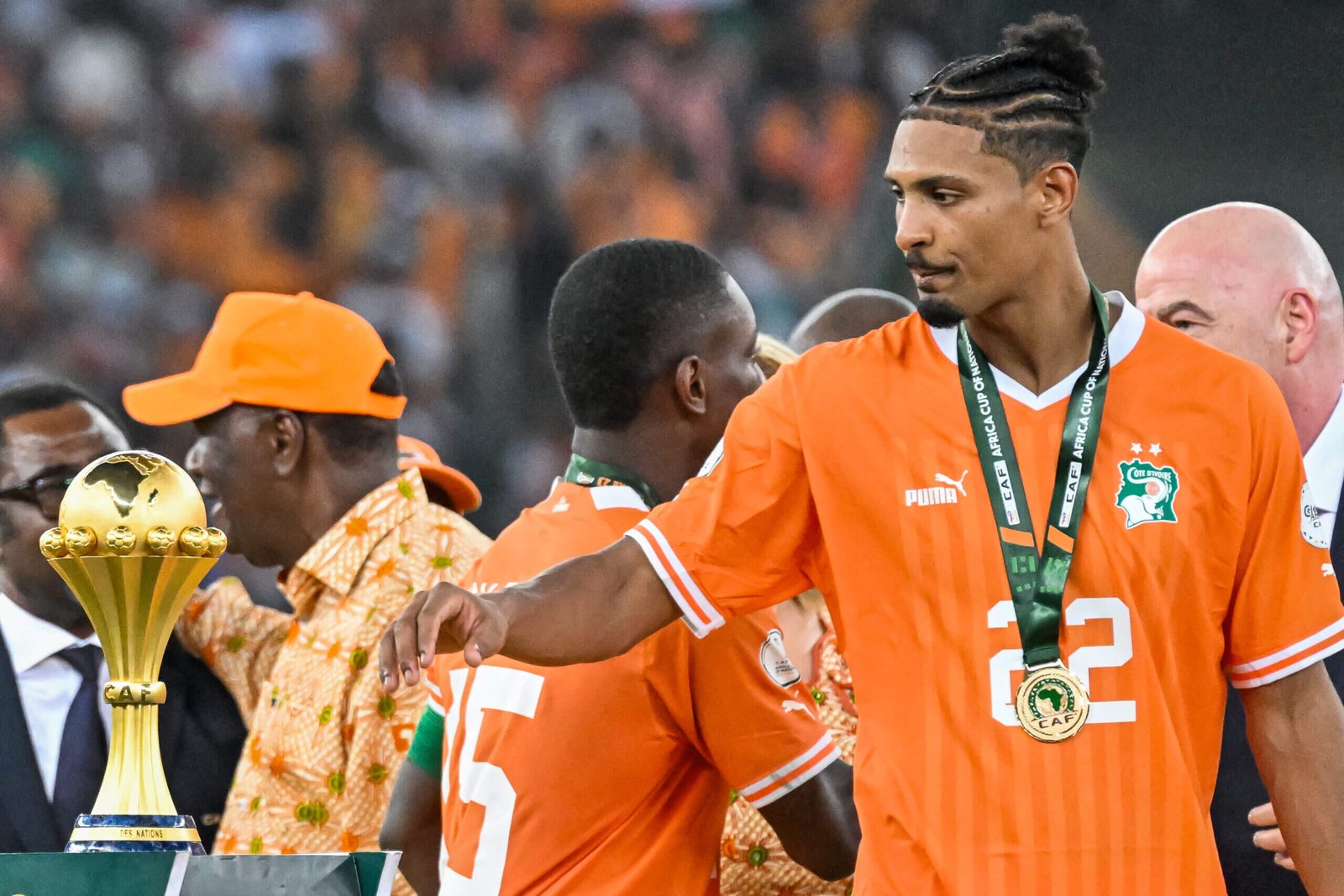“I walked down the stairs in the stands and people were shouting at me saying, ‘You are useless. You don’t even play, you just do commercials’. I felt a bit dead inside.”
Sebastien Haller is reliving the moment when Ivory Coast’s fans in the Alassane Ouattara Stadium turned on him following their 4-0 defeat to Equatorial Guinea in the group stages of the Africa Cup of Nations.
It was a humiliating result that left the hosts on the brink of elimination. An ankle injury meant Haller had not played a single minute at the tournament but as the team’s talisman, he bore the brunt of the fury.
Three weeks later in the same venue, Haller, 29, scored the winner in the final against Nigeria and Ivory Coast’s unlikely redemption had been completed. For Haller, that moment was a “reward” for everything he had endured since being diagnosed with a testicular tumour 18 months before.
Last week, The Athletic visited the Borussia Dortmund striker in Germany to find out how he went from sitting in a hospital bed with wires protruding from his neck to lifting the AFCON trophy.
A goal worth its weight in 𝗚𝗢𝗟𝗗. 🏆🇨🇮#TotalEnergiesAFCON2023 pic.twitter.com/ssO8MbDYmu
— CAF (@CAF_Online) February 15, 2024
Dortmund’s port is a 40-minute walk from the city centre. Next to the old harbour master’s office is a boat workshop renovated into a studio that hosts conferences, parties and weddings.
Haller is 6ft 2in (188cm) but appears taller, towering over everybody when he walks into the second-floor room and his tightly braided bun nearly brushes the ceiling.
Haller shows off his new boots and AFCON winners medal (Puma)
The former West Ham United forward has been filming promotional material for Puma and is reflecting on everything that has happened since he joined Dortmund in July 2022 from Ajax. The Germans had spent €34.5million (£30m; $38m at today’s rates) on him as a replacement for Manchester City-bound Erling Haaland. A couple of weeks later, during their pre-season training camp in Switzerland, Haller complained about an “annoying” pain around his abdomen.
“I checked a few times with my physio and we tried different things, but it never went away,” Haller tells The Athletic. “When I was with Dortmund, I asked the doctors if it was possible to have an (echocardiogram) and they saw something that was putting pressure on my abdomen.
“I had an MRI scan the next day and they found the tumour. They needed to check if it was malignant or benign. We checked after training and within 30 seconds, the doctor said, ‘You need to get surgery and we can get started today or tomorrow’.
“I said, ‘OK, but exactly what is it?’. Then I knew it was cancer. This is a strong word and it scares everyone — no one wants to have it — but once you have cancer, you have more knowledge about it.”
Haller underwent an operation to remove the tumour and started chemotherapy, which involved five-day stints in hospital hooked up to a catheter. He had three rounds of treatment and a second surgical procedure to extract the residual findings from the tumour. It took its toll.
“The last two days (of chemotherapy) were the strongest in terms of the side effects,” Haller says. “You still have 48 hours to wait and then you need to drive for two and a half hours (from Munster University Hospital in Germany to his Netherlands home) during the night. That was the worst part.
“When you arrive home it’s 2am. It’s difficult to stand, you just want to stay in your bed, but my physio (Tanguy Fleury) would prepare sessions for me the next morning. I would go even if I didn’t feel right; I would do what I could. I was in the gym running with some weights because it was healthy for the body.”
Haller had a strong support system around him, including his wife, Priscilla, their three children and his siblings, Armelle and Sery. At one stage of his recovery, he visited Cannes with a group of friends, where he played golf and cycled. In October 2022, he attended the Ballon d’Or ceremony in Paris and received applause when he presented an award. He never considered retiring but admits there were “challenging moments”.
“You become another person but you don’t even realise,” he says. “You try to act the best you can, but you’re suffering. The people around you try to hide their sadness and emotion, but it is difficult.
“You become less patient, angrier and more emotional. When everyone tries to hide their emotions and change the way they act it becomes complicated — communication is everything.”
By December 2022, Haller had made a full recovery and was cleared to play again. He went to Dortmund’s winter training camp in Marbella and scored a hat-trick in seven minutes during a 6-0 friendly win over Swiss side Basel.
The striker made his competitive return, and Dortmund debut, in a 4-3 victory over Augsburg on January 22 while wearing a pair of boots that had “F*ck cancer” inscribed on the side. The moment he had been dreaming about arrived when he scored against Freiburg on February 4 — World Cancer Day.

Haller’s boots from his January 2023 comeback (Alex Grimm/Getty Images)
“I received messages from people telling me that because of my experience, they were checked out and discovered they had something,” says Haller, who has been organising sports sessions for chemotherapy patients. “I’m incredibly proud to know that I’ve helped even one person.
“That’s why I made the documentary (‘Le Combat d’Haller’ — Haller’s Fight) because I wanted to show my normal life even if I’m sick. Everyone can be sick, but you need to stand up once you fall, get help from your family and friends and enjoy every moment you can.”
In the final few weeks of the 2022-23 season, Haller hit a hot streak. He scored eight goals in 10 games as Dortmund edged closer to winning the Bundesliga title for the first time in a decade.
However, they drew 2-2 with Mainz on the final day of the season and Haller missed a penalty. Jamal Musiala’s last-minute winner for Bayern Munich against Cologne meant the Bavarian side retained the title on goal difference.
“It was the biggest disappointment I have had in football,” Haller says. “It was harder to accept than my illness because I could have an impact on it. I was not just a victim but an actor. It was so painful.
“In these moments, you realise you are lucky and blessed to have family and friends around you. If I was by myself, I would have probably stayed in the ground for one week and not moved.”
It was not his first career setback. West Ham spent a club record £45million to sign Haller from Eintracht Frankfurt in July 2019. After a disappointing start to the 2019-20 season, head coach Manuel Pellegrini was replaced by David Moyes. West Ham finished 16th, five points above the relegation zone, with Haller scoring seven goals in 32 league appearances — he only scored once in his final 13 games, though. In January 2021, the striker joined Ajax for £20m.
“West Ham was challenging but I learned a lot,” he says. “It was a nice experience even if I left after 18 months. It was way too short but I had to make a decision. I could stay on the bench and not be useful, but even if I play I’m probably not the right man for the team, or go somewhere with someone I know.”
The “someone” Haller is talking about is Erik ten Hag, who coached him for two years at Utrecht and took him to Ajax. Haller rediscovered his form and scored 32 times in 50 Eredivisie appearances while he matched multiple records in the Champions League, becoming the second player, after Cristiano Ronaldo, to score in all six group games.
Ajax won the Dutch title in successive seasons and earned Haller a move to Dortmund, while Ten Hag took charge at Manchester United.

Haller struggled for goals at West Ham (Peter Byrne – Pool/Getty Images)
“Ten Hag really invests his time and energy into getting the best out of his team,” Haller says. “This is England and Manchester United, people don’t even want to know what is going on behind the scenes — they just want results.
“When I was in Utrecht, he was my neighbour. This guy never stops working. This is the only thing he does and he wants to do it well. You need to adapt to your environment and I’m sure he will do some good things — he already has. I wish him all the best. Thanks to him, I could succeed.”
Haller’s time in London was not wasted. though: it was where he decided his international future.
Haller’s mother grew up in Gagnoa, which is 145 miles from Ivory Coast’s economic capital of Abidjan, and moved to France when she was around 18 where she met his father. Haller was born near Paris and represented France at multiple age groups, including the Under-17 World Cup in 2011 where he played alongside Aymeric Laporte and Kurt Zouma.
He switched nationality and in November 2020 made his debut for Ivory Coast in a 2-1 victory over Madagascar. Haller’s story is not uncommon: a third of the players at AFCON were born outside of Africa.
“I represented France at every youth level — when I became a professional some people told me I could play for Ivory Coast but a lot of things were not stable and when you just start your career it’s difficult to make such a strong choice,” he says.
“When I was with West Ham, I hadn’t played for France for a few years. I was speaking with the (Ivory Coast) coach, Patrice Beaumelle, because he wanted me to come and play. As a father, I wanted to get closer to my Ivorian origins, so I said, ‘Maybe this is the time. Things are changing. I can be useful to this team. Why not win something? It could be a beautiful story’.”
In the final game before the Bundesliga’s winter break, Haller twisted his ankle and, with AFCON approaching, Dortmund’s medical department gave him a recovery timeline of two months.
Jean-Louis Gasset still included Haller and Brighton & Hove Albion’s injured winger Simon Adingra in Ivory Coast’s squad. The pair were put on specialised training programmes with the hope they would return during the knockout stage.
“I spent the whole competition going breakfast, treatment, gym, treatment, gym. I finished every day at 1am because I was doing all this work.”

Haller eyes up the AFCON trophy after scoring the winner in the final (Sia Kambou/AFP via Getty Images)
Ivory Coast won their opening group game but lost to Nigeria and imploded against Equatorial Guinea to leave their chances of progressing dangling by a thread.
“It was a nightmare,” Haller says. “You feel like nothing is working as you want. You come, you’re injured, you can’t play and you’re going to be eliminated. It was such a waste of energy and time for a lot of people and money for some as well. It was a dream that was going away.”
Morocco’s 1-0 victory over Zambia saved them. Ivory Coast qualified as one of the best third-placed teams and would face the 2021 champions Senegal. Gasset was sacked and replaced by his assistant Emerse Fae, although Ivory Coast tried and failed to appoint their former head coach Herve Renard — who is now in charge of France women’s side — for the rest of the competition.
“It was tough but we had no time to be emotional,” Haller says. “We had a responsibility and had to show we deserved a second chance.”
Ivory Coast coast continued to flirt with danger as they came from behind to beat Senegal via a penalty shootout. Odilon Kossounou was sent off in the first half of their quarter-final against Mali and they went 1-0 down before Adingra and Oumar Diakite scored. Nigeria’s defensive record had been the best in the competition and William Troost-Ekong’s header put them 1-0 up in the final. Franck Kessie equalised before Haller produced his crowning moment. Fae described their triumph as “more than a fairytale”.
“I don’t even know how it was possible,” Haller says. “It’s just destiny. We can try to explain it but the truth is that we don’t control anything.”
(Top photo: Alexandre Simoes/Borussia Dortmund via Getty Images)
Read the full article here


